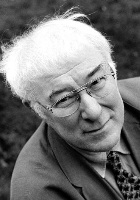‘When all the others were away at Mass' Poem by Seamus Heaney
‘When all the others were away at Mass'
[from Clearances in memoriam M.K.H., 1911-1984]
3
When all the others were away at Mass
I was all hers as we peeled potatoes.
They broke the silence, let fall one by one
Like solder weeping off the soldering iron:
Cold comforts set between us, things to share
Gleaming in a bucket of clean water.
And again let fall. Little pleasant splashes
From each other's work would bring us to our senses.
So while the parish priest at her bedside
Went hammer and tongs at the prayers for the dying
And some were responding and some crying
I remembered her head bent towards my head,
Her breath in mine, our fluent dipping knives-
Never closer the whole rest of our lives.
Picturesque of setting is so realistic and the moment of urge.
Beautiful sonnet with some fantastic imagery. In the last 6 lines, Heaney tells us that, rather than say prayers like the priest or respond to the prayers like the other people at her bedside, he chose to remember the moment he was closest to his dying grandma, which wasn't at some important, grand occasion, but in a simple domestic act. The first 8 lines describe the memory that comes to him, the times they shared only in each other's company, preparing potatoes, both engrossed in this task that will benefit the whole household. This memory takes place When all the others were away at Mass, mirroring his decision to ignore the priest's prayers at her bedside. Maybe if it weren't for them both missing Mass, they never would have shared such moments of silent communion with one another. There's certainly the suggestion in that hammer and tongs of desperation to the priest's fervour, almost as if he really knows of and is overcompensating for his and his religion's own ultimate ineffectuality. There's even a sense of intrusion because Heaney knows this woman preferred to go and prepare the food than listen to Mass and evidently shared that preference. In fact, it seems the bond that united them was a suspicion of religious bombast, but rather than strain and struggle against it, they kept their counsel and let others choose to believe what they wished. That last point is important. Just as their silent nonconformity was expressed only in silent labour, peeling potatoes, this sonnet, by being so carefully crafted, doesn't just describe the memory, it shows how memory can be expressed in such powerfully evocative language that it can offer something similar but more sure to what the Mass and the priest are offering, it can overcome death. And, while the priest has no proof for his offer of an afterlife, the poet can point to poetry that has lived for thousands of years. The skill of the poet has taken something that would usually be insignificant and, in memoriam, transformed it into a living epitaph that people will relate to very strongly for who knows how many years. That is the power of great art.
I suspect this is a poem recounting an intimate moment with a girlfriend.
This poem has not been translated into any other language yet.
I would like to translate this poem
This was read, by my sister, at my mother's funeral last Friday...so poignant and yet true.
This was read by my brother at my mum's funeral last December. Valuable moments, poignant and true indeed. She was, like Heaney, from Ireland. I hope you're coping with the loss, Gerry.